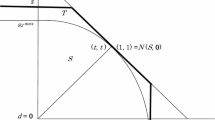Abstract
Given a bargaining problem, the relative utilitarian (RU) solution maximizes the sum total of the bargainer’s utilities, after having first renormalized each utility function to range from zero to one. We show that RU is “optimal” in two very different senses. First, RU is the maximal element (over the set of all bargaining solutions) under any partial ordering which satisfies certain axioms of fairness and consistency; this result is closely analogous to the result of Segal (J Polit Econ 108(3):569–589, 2000). Second, RU offers each person the maximum expected utility amongst all rescaling-invariant solutions, when it is applied to a random sequence of future bargaining problems generated using a certain class of distributions; this is recalls the results of Harsanyi (J Polit Econ 61:434–435, 1953) and Karni (Econometrica 66(6):1405–1415, 1998).
Similar content being viewed by others
References
Cao X (1982) Preference functions and bargaining solutions. In: Proceeedings of the 21st IEEE conference on decision and control, vol 1, pp 164–171
d’Aspremont C, Gevers L (1977) Equity and the informational basis of collective choice. Rev Econ Stud 44: 199–209
Dhillon A (1998) Extended Pareto rules and relative utilitarianism. Soc Choice Welf 15(4): 521–542
Dhillon A, Mertens J-F (1999) Relative utilitarianism. Econometrica 67(3): 471–498
Harsanyi J (1953) Cardinal utility in welfare economics and in the theory of risk-taking. J Polit Econ 61: 434–435
Harsanyi J (1955) Cardinal welfare, individualistic ethics and interpersonal comparisons of utility. J Polit Econ 63: 309–321
Harsanyi J (1977) Rational behaviour and bargaining equilibrium in games and social situations. Cambridge University Press, Cambridge
Kalai E (1977) Proportional solutions to bargaining situations: interpersonal utility comparisons. Econometrica 45(7): 1623–1630
Kalai E, Smorodinsky M (1975) Other solutions to Nash’s bargaining problem. Econometrica 43: 513–518
Karni E (1998) Impartiality: definition and representation. Econometrica 66(6): 1405–1415
Karni E (2003) Impartiality and interpersonal comparisons of variations in well-being. Soc Choice Welf 21(1): 95–111
Karni E, Weymark JA (1998) An informationally parsimonious impartial observer theorem. Soc Choice Welf 15(3): 321–332
Maskin E (1978) A theorem on utilitarianism. Rev Econ Stud 45(1): 93–96
Muthoo A (1999) Bargaining theory with applications. Cambridge university Press, Cambridge
Myerson RB (1981) Utilitarianism, egalitarianism, and the timing effect in social choice problems. Econometrica 49(4): 883–897
Nash J (1950) The bargaining problem. Econometrica 18: 155–162
Ng Y-K (1975) Bentham or Bergson? Finite sensibility, utility functions, and social welfare functions. Rev Econ Stud 42: 545–569
Ng Y-K (1985) The utilitarian criterion, finite sensibility, and the weak majority preference principle. A response Soc Choice Welf 2(1): 37–38
Ng Y-K (2000) From separability to unweighted sum: a case for utilitarianism. Theory Decis 49(4): 299–312
Roemer JE (1998) Theories of Distributive Justice. Harvard University Press, Cambridge
Segal U (2000) Let’s agree that all dictatorships are equally bad. J Polit Econ 108(3): 569–589
Author information
Authors and Affiliations
Corresponding author
Rights and permissions
About this article
Cite this article
Pivato, M. Twofold optimality of the relative utilitarian bargaining solution. Soc Choice Welf 32, 79–92 (2009). https://doi.org/10.1007/s00355-008-0313-0
Received:
Accepted:
Published:
Issue Date:
DOI: https://doi.org/10.1007/s00355-008-0313-0



